An International Human Rights Day Event at the mdw
The mdw held its second-ever celebration of Human Rights Day on 10 December 2019 with a panel discussion addressing the themes of human rights, equality, and anti-discrimination. On this evening, Rector Ulrike Sych welcomed the artist, author, and arts-based researcher Belinda Kazeem-Kamiński of the Academy of Fine Arts Vienna, ethnomusicologist Marko Kölbl of the mdw, Austrian Supreme Administrative Court Vice President Anna Sporrer, and ethnomusicologist Shzr Ee Tan of the University of London’s Royal Holloway College.
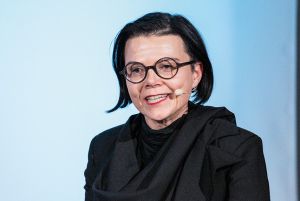
In three rounds of questions regarding contexts, the current situation, and possible visions for the future of effective equal treatment and anti-discrimination measures at Austrian arts universities, moderator Rosa Reitsamer, professor of music sociology at the mdw, set the stage for the evening’s panellists to contribute their experience and expertise regarding discrimination-free studies.
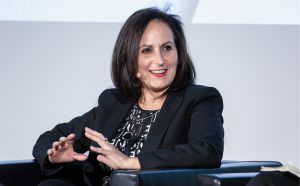
Justice Anna Sporrer emphasised how Austria’s Federal Equal Treatment Act is primarily concerned with placing a clear focus on the efficacy of human rights and equal treatment in society at large—which is thoroughly in keeping with the intentions of the European Court of Justice. “Human rights must be seen to be done.” According to Austrian law, equal treatment must be realised in all areas of society and at all levels without regard for ethnic belonging, religion or worldview, age, or sexual orientation. But where antidiscrimination measures frequently begin is with both fundamental sensitisation to and awareness-raising with regard to discrimination.
Arts universities play an ambivalent role, here: though generally viewed as being especially progressive, inclusive, and open, it’s still the case that their institutional structures are quite slow to change.
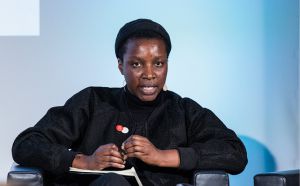
Belinda Kazeem-Kamiński pointed out that the staffs of equal opportunity offices and the memberships of working groups concerned with equality as well as other university decision-making bodies such as search committees need to become more inclusive. She stressed how real-life inclusion applies to all intersectional categories—meaning not only ethnicity but also gender, class, sexual orientation, age, (dis)ability, and religion. And as part of this, esteeming communication on the part of all protagonists both within the University context and beyond is fundamental to a functioning democracy.

Marko Kölbl, a member of the Working Group on Equal Opportunities at the mdw and a senior researcher in the University’s ethnomusicology programme, likewise spoke on the issue of becoming aware of discrimination in its various forms. Doing so, he said, necessarily includes engaging in deliberate and enlightening discourse particularly with regard to individual musical instruction, a context where student-teacher relationships are especially prone to “getting out of balance” in terms of proximity and distance. What’s more, he said, recognising transgressions for what they are is based on a process of developing awareness that either takes place or fails to take place depending on professional and—not to be forgotten!—family pressures. And in this respect, the #MeToo debate has now also reached arts universities.
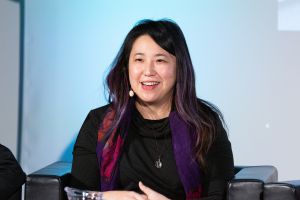
The situation outside of Austria was addressed by Shzr Ee Tan, who introduced herself as “East-Asian, born in Singapore”. She characterised Great Britain’s colonial heritage as ambivalent: in the history of colonialism, she said, Western classical music embodied a form of “soft power”, the effects of which can be felt to this day. And despite arts universities’ present-day stance of openness and inclusion, various forms of stereotyping and racialisation persist.
An example on which Tan is currently working together with musicologist Maiko Kawabata is the racialisation of East Asian musicians in the classical music field—and Tan describes the project of deconstructing the phantasm in which young East Asian and/or Chinese musicians threaten the hegemonic power of white Western musicians as “undoing the script” (see interview on p. 8).
Viewed in a more positive light, it has been international students—particularly citizens of third states, who make up 22% of aspiring artists studying at the university level in Austria, according to a 2015 IHS study1—who have made inclusion unavoidable. It is they who raise awareness of discrimination among the general populace and actively push for inclusion.
Another central question was therefore as to the relationships between structural forms of exclusion such as racism and sexism, individuals’ tactics for dealing with them, and institutional strategies for transforming precisely such structural factors on the basis of fundamental rights. The consensus on the podium was that avoiding and ignoring the topic of discrimination does not solve the problem. The priority must rather be to imbue all teaching and institutional events with a perspective that is sensitive to discrimination and critical of power.
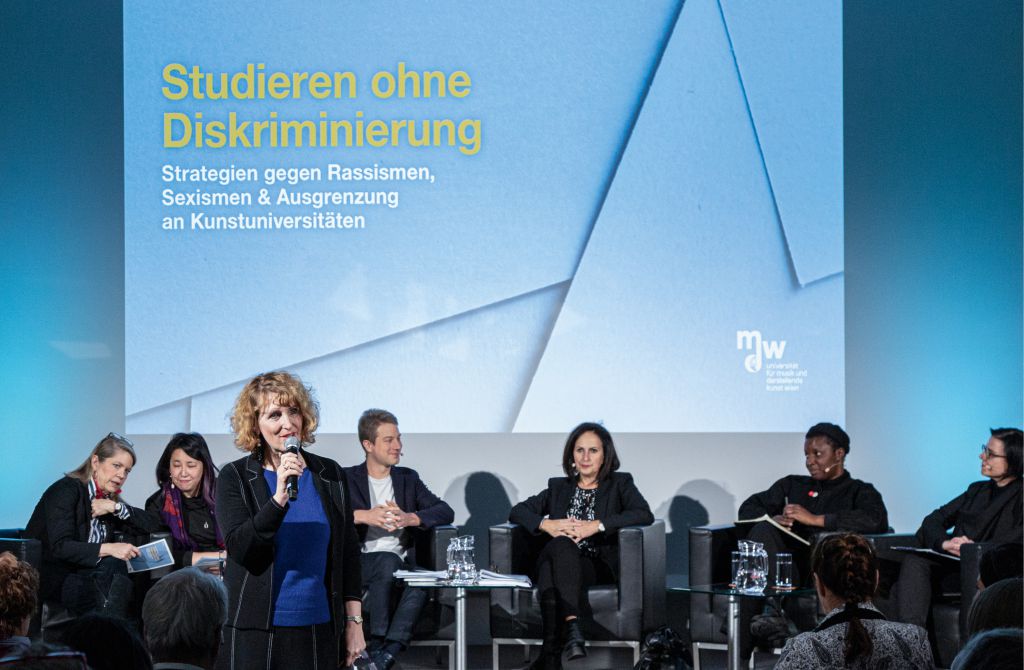
During the discussion, Rector Ulrike Sych pointed out that the fields in which future graduates will eventually work must not be forgotten. After all, the University provides only an initial, protected space for experimentation. But even so, the panel concluded, there are no entirely discrimination-free spaces; all that we can really do is attempt to make spaces such as classrooms at least more sensitive to discrimination in keeping with the spirit of bell hooks’ socially committed pedagogy. For while diversity training measures can be helpful in implementing diversity strategies, they do not embody a guarantee of real-life antidiscrimination efforts and equal treatment.

